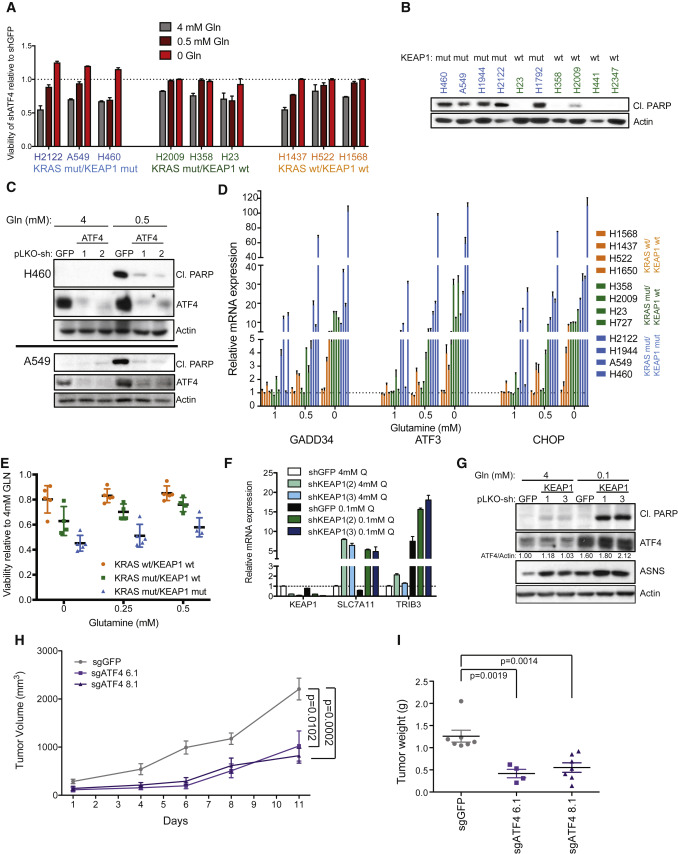当前位置:
X-MOL 学术
›
Cancer Cell
›
论文详情
Our official English website, www.x-mol.net, welcomes your
feedback! (Note: you will need to create a separate account there.)
Oncogenic KRAS Regulates Amino Acid Homeostasis and Asparagine Biosynthesis via ATF4 and Alters Sensitivity to L-Asparaginase.
Cancer Cell ( IF 48.8 ) Pub Date : 2018-01-08 , DOI: 10.1016/j.ccell.2017.12.003 Dana M. Gwinn , Alex G. Lee , Marcela Briones-Martin-del-Campo , Crystal S. Conn , David R. Simpson , Anna I. Scott , Anthony Le , Tina M. Cowan , Davide Ruggero , E. Alejandro Sweet-Cordero
Cancer Cell ( IF 48.8 ) Pub Date : 2018-01-08 , DOI: 10.1016/j.ccell.2017.12.003 Dana M. Gwinn , Alex G. Lee , Marcela Briones-Martin-del-Campo , Crystal S. Conn , David R. Simpson , Anna I. Scott , Anthony Le , Tina M. Cowan , Davide Ruggero , E. Alejandro Sweet-Cordero

|
KRAS is a regulator of the nutrient stress response in non-small-cell lung cancer (NSCLC). Induction of the ATF4 pathway during nutrient depletion requires AKT and NRF2 downstream of KRAS. The tumor suppressor KEAP1 strongly influences the outcome of activation of this pathway during nutrient stress; loss of KEAP1 in KRAS mutant cells leads to apoptosis. Through ATF4 regulation, KRAS alters amino acid uptake and asparagine biosynthesis. The ATF4 target asparagine synthetase (ASNS) contributes to apoptotic suppression, protein biosynthesis, and mTORC1 activation. Inhibition of AKT suppressed ASNS expression and, combined with depletion of extracellular asparagine, decreased tumor growth. Therefore, KRAS is important for the cellular response to nutrient stress, and ASNS represents a promising therapeutic target in KRAS mutant NSCLC.
中文翻译:

致癌性KRAS通过ATF4调节氨基酸稳态和天冬酰胺的生物合成,并改变对L-天冬酰胺酶的敏感性。
KRAS是非小细胞肺癌(NSCLC)中营养应激反应的调节剂。在营养耗尽期间诱导ATF4途径需要在KRAS下游使用AKT和NRF2。在营养胁迫期间,肿瘤抑制因子KEAP1强烈影响该途径的激活。KRAS突变细胞中KEAP1的缺失会导致细胞凋亡。通过ATF4调节,KRAS可以改变氨基酸摄取和天冬酰胺的生物合成。ATF4靶标天冬酰胺合成酶(ASNS)有助于凋亡抑制,蛋白质生物合成和mTORC1激活。抑制AKT抑制了ASNS的表达,并与细胞外天冬酰胺的耗竭相结合,降低了肿瘤的生长。因此,KRAS对于细胞对营养胁迫的反应很重要,而ASNS代表KRAS突变体NSCLC中有希望的治疗靶点。
更新日期:2018-01-08
中文翻译:

致癌性KRAS通过ATF4调节氨基酸稳态和天冬酰胺的生物合成,并改变对L-天冬酰胺酶的敏感性。
KRAS是非小细胞肺癌(NSCLC)中营养应激反应的调节剂。在营养耗尽期间诱导ATF4途径需要在KRAS下游使用AKT和NRF2。在营养胁迫期间,肿瘤抑制因子KEAP1强烈影响该途径的激活。KRAS突变细胞中KEAP1的缺失会导致细胞凋亡。通过ATF4调节,KRAS可以改变氨基酸摄取和天冬酰胺的生物合成。ATF4靶标天冬酰胺合成酶(ASNS)有助于凋亡抑制,蛋白质生物合成和mTORC1激活。抑制AKT抑制了ASNS的表达,并与细胞外天冬酰胺的耗竭相结合,降低了肿瘤的生长。因此,KRAS对于细胞对营养胁迫的反应很重要,而ASNS代表KRAS突变体NSCLC中有希望的治疗靶点。











































 京公网安备 11010802027423号
京公网安备 11010802027423号